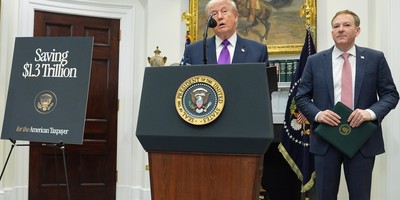Leftists are crowing about a new public survey that they claim shows robust, or even overwhelming, support for single-payer healthcare -- which they refer to as "Medicare for All." As usual, whenever Medicare is invoked in this context, it is imperative to note the mathematical reality that the existing program is currently on an express train to insolvency, according to government accountants. Undaunted, an increasing number of Democrats are determined to take the financially-doomed program for seniors and massively expand it to the entire population. And look, they say, it's popular:
When people are told that Medicare for All would “guarantee health insurance as a right for all Americans,” support shoots up to 71 percent. https://t.co/cVOvakOZpO
— Keith Ellison (@keithellison) January 23, 2019
Overall, a majority of Americans (56/42) initially favor "Medicare for All." But as I've argued repeatedly, and will continue to argue, this is a disastrous policy. It would (1) uproot well over 150,000,000 Americans from their existing healthcare arrangements, (2) hand much more unaccountable power over to an unresponsive and often incompetent federal bureaucracy, (3) inevitably increase wait times for care through rationing, (4) deeply hamper America's world-leading innovation in the critical field of medical technology, and (5) require truly enormous tax increases on every single American worker and family. How might those, shall we say, "policy tradeoffs" sit with voters? Not well:
Survey shows support for 'Medicare for all’ plunges when people are asked if they’d pay higher taxes or put up with treatment delays to get it. https://t.co/DgIKAQYOsG
— AP Politics (@AP_Politics) January 23, 2019
The poll found that Americans initially support “Medicare-for-all,” 56 percent to 42 percent. However, those numbers shifted dramatically when people were asked about the potential impact, pro and con. Support increased when people learned “Medicare-for-all” would guarantee health insurance as a right (71 percent) and eliminate premiums and reduce out-of-pocket costs (67 percent). But if they were told that a government-run system could lead to delays in getting care or higher taxes, support plunged to 26 percent and 37 percent, respectively. “The issue that will really be fundamental would be the tax issue,” said Robert Blendon, a professor at the Harvard T.H. Chan School of Public Health who reviewed the poll. He pointed out that state single-payer efforts in Vermont and Colorado failed because of concerns about the tax increases needed to put them in place.
Recommended
Democrats inveighed against the GOP-passed tax reform law of 2017 by warning -- falsely -- that it was a tax increase on the middle class, eventually shifting to complain that the middle class tax cuts weren't permanent (before voting en masse against making them permanent). In light of the political anathema that is hiking taxes on the non-"rich," let there be no mistake: Single-payer health care would absolutely, positively force tax rates much higher on middle income and working class Americans. Please recall this menu of ugly options to cover the annual (!) $3.2 to $3.8 trillion price tag (for context, the entire federal budget in 2017 was $4 trillion) of "Medicare for All," which would bend the total American healthcare cost curve upward by four-to-six trillion dollars over its first decade alone:
The Mercatus Study -- like others -- shows that "Medicare for All" would require a federal tax hike of roughly 10% of GDP even after capturing state govt. savings.
— Brian Riedl (@Brian_Riedl) July 30, 2018
But capturing the savings to families into a "single-payer tax" is not easy -- which is why Sanders comes up short pic.twitter.com/Etfjk22sQc
Perhaps the most efficient way to achieve that would be to combine the top three revenue generators listed: Raise the payroll tax (paid for by workers and employers) by ten percentage points for everyone, impose a brand new 20 percent national VAT/sales tax, and hike income tax rates across the board by ten percentage points. Not one of those three; all of those three. That is an extraordinary, radical, humongous package of tax increases on virtually all Americans. Please notice that cobbling together a string of more populist "fair share" nibblings that tend to poll better would result in woefully insufficient revenues.
If the general concept of tax increases to pay for single-payer drags public support down into the 30's, how would the bruising blend of hikes mentioned above go over with Mr. and Mrs. Taxpayer? As for delays in treatment, that consequence is an unavoidable side effect of government-run systems, as we've seen at the VA, and in places like Great Britain (where entire types of surgeries are sometimes postponed nationwide for months, with even more drastic measures being debated), and Canada. Americans would have their existing plans canceled, be given far fewer options, wait longer (already polling at 26 percent) for care, and relinquish decision-making power to a centralized government machine under "Medicare for All." And that's even if we somehow had a realistic or palatable way to pay for it, which we don't.
There's a reason why this idea crashed and burned in Colorado, was abandoned in uber-liberal Vermont, and would shatter California's broken budget. The failed state-level experiments are already speaking for themselves -- loudly. I'll leave you with a useful refutation of the deeply misleading statistics that are often invoked to justify demolishing America's world-class healthcare status quo in favor of a government supremacist regime.

























Join the conversation as a VIP Member